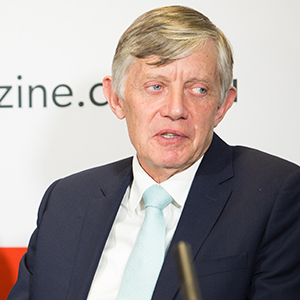SMSF trustees and advisers will go into the 2019 federal election knowing what the opposition has mapped out for the sector and its potential impact, but as Jason Spits writes, they will still need to wait further before knowing what proposals actually become policies, or even laws.
The 2019 federal election will be fiercely contested by both major parties and its outcome will be keenly watched by those who work in the self-managed superannuation sector and trustees.
While the wider landscape of financial services is receiving particular attention following the release of the final report of the Hayne royal commission, SMSF advisers and trustees will be looking at the range of policy proposals put forward by opposition treasury spokesman Chris Bowen that affect the superannuation sector.
Since announcing the proposals, one matter has captured plenty of attention – the scrapping of franking credit refunds for SMSFs in pension phase where no members are receiving a pension.
At the time of writing, a parliamentary committee is conducting an inquiry into the proposal and has received around 1000 written submissions, as well as many verbal representations from self-funded retirees and SMSF trustees at a series of public hearings. One industry figure, I love SMSF founder Grant Abbott, has even gone as far as creating a political party to take the issue directly into Parliament.
What’s on the table
It is, however, worth keeping in mind the franking credit refunds proposal is part of a larger package of tax changes released by Bowen, all of which the opposition has committed to taking into the election, and through Parliament if it is successful in winning government.
While a single document detailing the opposition’s plans has not been released, the list below represents the majority of the positions a Shorten-led Labor government would take when considering superannuation, retirement policy and SMSFs:
- scrapping of franking credit refunds for SMSFs in pension phase where no members are receiving a part or full age pension,
- reducing the concessional contributions cap to $20,000,
- reducing the non-concessional contributions cap from $100,000 to $75,000,
- eliminating the tax-deductible status for personal super contributions,
- getting rid of the catch-up provisions for unused concessional contributions caps for up to five years,
- Division 293 tax – reducing the threshold from $250,000 to $200,000 when people have their concessional super contributions taxed at 30 per cent as opposed to 15 per cent,
- banning the use of limited recourse borrowing arrangements in SMSFs,
- scrapping negative gearing except for investments in new property developments,
- taxing all discretionary (family) trusts at 30 per cent, and
- reducing the capital gains tax (CGT) tax-deductible discount from 50 per cent to 25 per cent on all investments after some specified dates in the future.
Keep calm and wait for the policy
The first thing to keep in mind when reviewing the list above is they are still only proposals that have to survive an election campaign, accompany the Labor Party into government, enter Parliament and proceed through both houses intact, according to Self-managed Independent Superannuation Funds Association managing director Michael Lorimer.

“These changes represent a significant impact on super and will stretch the time people will need for their retirement planning, while conversely restraining younger people from moving their own funds into the superannuation system.”
Graeme Colley, SuperConcepts
While that may seem a lengthy process at this stage, keep in mind the time frames that went into getting the Future of Financial Advice reforms through Parliament, or more recently the efforts the current government undertook to advance the new education framework for financial advisers from policy to reality.
“All the indications are that the federal opposition will proceed with all the proposed measures, and we have not seen any wriggle room at all, particularly given the measures were signed off at the recent Labor Party conference,” Lorimer says.
He continues the measures are mainly driven by budgetary concerns and he does not consider them to be politically or ideologically motivated, pointing to the franking credits proposal as a case in point. The financial cost of this shift alone has been cited by Bowen as saving the budget $11.4 billion over the four-year forward estimates period, and $59 billion over the decade to 2028/29. This is despite the fact to date franking credits have not been included as a line item in the budget.
Franking fears
Regardless of the basis for Labor’s proposals, Lorimer says the level of concerns raised by the proposed changes is realistic and wide-ranging.
“The issue of franking credits goes beyond retirees and affects anybody with indirect and direct Australian equities exposure, but is a silo-based policy that looks at a narrow piece of the tax system, instead of being considered as part of broader tax reform like the introduction of franking credits refunds was during the GST reforms,” he says.
As mentioned earlier, there is no official policy document available regarding the proposal to remove franking credit refunds, but it would appear the main impact on SMSFs applies to those that are partly or fully in retirement phase, not recieving the age pension, and wholly or partially exempt from tax, and under current tax law.
Under the proposal, these funds will not be able to claim a refund for any franking credits that are in excess of the tax payable by the fund.
HLB Mann Judd wealth management partner Jonathan Philpot says this change would equate to a reduction of about half a per cent of earnings for those with an SMSF balance of $1 million and Bowen was likely taking a calculated electoral risk in targeting SMSF trustees.

“All the indications are that the federal opposition will proceed with all the proposed measures, and we have not seen any wriggle room at all, particularly given the measures were signed off at the recent Labor Party conference.”
Michael Lorimer, Self-managed Independent Superannuation Funds Associatin
“The ALP may see this as non-vote loss, in that SMSF trustees were not going to vote for them anyway. It is, however, unlikely to get through Parliament as it stands with independent senators likely to control the Senate after the next federal election, and they appear to not be supportive of the franking credit changes,” Philpot says.
BT head of financial literacy and advocacy Bryan Ashenden also recognises the impact on SMSF trustees, but reminds advisers and trustees to wait for the election and then the legislation before considering if the franking credit issue is an appropriate driver for change.
“There are a number of factors to process when considering a response and these include the size of an investment in Australian equities, if the franking credit refunds are greater than the tax payable in the fund and if the fund is in pension phase,” Ashenden says.
“Trustees also need to consider that if they miss out on a franking credit refund, does that mean the investment was a bad idea in the first place?”
Early indications from the market seem to show some listed companies regard the proposal as a negative, with growing reports they are looking to post a special, early dividend so shareholders, including SMSF members, can take advantage of the franking credits prior to any potential change of government.
While this may deal with the issue in the current financial year, SuperConcepts SMSF technical and private wealth executive manager Graeme Colley says there are a number of strategies that will remain available to SMSF advisers and trustees allowing them to minimise the future impact of the proposed change to franking credits.
These include transferring investments from retirement to accumulation phase to absorb any franking credits against the taxable income of the SMSF, but this may be a zero sum game in the event where the tax payable in the accumulation or retirement phases is nil.
Additional strategies include making concessional contributions to an SMSF to use any excess franking credits, changing investments to those with a lower or no franking credit amount, withdrawing an investment from super and investing it in your own name – though this requires careful tax planning, and adding new members to the fund who will still be in the accumulation phase.
Interestingly, while these strategies are on the table, Colley is not recommending trustees pick them up and run with them just yet, reiterating the message from Lorimer and Ashenden to wait and see what the election will bring.
Cuts to caps
Strategies may exist to manage the loss of franking credit refunds to ease those concerns, but Colley admits he is concerned about the suggestions to make further changes to concessional and non-concessional contribution caps, adding they are likely to receive strong support in the Senate from Labor and the Greens.
Philpot has also identified these changes as significant, claiming they further undermine the confidence people have in the superannuation system.
“If the maximum someone can have in a pension account is $1.6 million, the question then is how can they get to that threshold before they reach age 65,” he says.
“At present, to achieve that goal in an ideal situation someone would have to start a fund at age 40 with a $100,000 balance and ensure they make the maximum allowable contributions each year and earn about 7 per cent at the same time.”
“Reducing contribution caps even further will just push the time when they have to start the fund, and contributing to it, back into their 30s, at a time when they are still paying off debt.”
Undermining consumer confidence
Philpot says the best position for Labor to take into the election is to leave contribution caps alone, instead of eroding the good work that has gone into building the current system, while also considering the impact of its proposals on the SMSF sector as well as the wider superannuation system.
“These changes will have an impact on current trustees, but for those heading into retirement one of the benefits of being able to save for their own retirement is being reduced again,” he explains.
Lorimer also views the impact of Labor’s contribution cap proposal as going beyond the dollars someone can place into a fund, but what it communicates to consumers about the stability of the superannuation system.
“Consumers have been asked to enter into a long-term retirement contract where the rules stay the same, but may ask why they should bother, why they should engage at all, if those rules change,” he says.
He acknowledges changes to the contribution caps will not stop contributions, but rather will hinder the ability of people to accelerate the growth of their savings by imposing limits each year.
“The superannuation system should accommodate the ability for people to grow their super, which is why we also consider reversing the catch-up provisions for unused contributions caps is a poor idea, as it has been a great vehicle for low-balance holders in the past,” he says.
He notes it is important to remember nearly all of the proposed changes coming from Bowen, with the exception of scrapping the use of limited recourse borrowing arrangements for SMSFs, impact on all superannuants. Despite this, he says it is still too early to craft any firm responses or create strategies to deal with the impact of the changes.
Colley points out even if people could start planning, it is only high net worth trustees and fund members who would have the resources to do so, while many others would be disadvantaged before being able to make use of the current arrangements.
“High net worth people can restructure their portfolios to avoid the impact of franking credits and have already made use of the contribution caps,” he says.
“These changes represent a significant impact on super and will stretch the time people will need for their retirement planning, while conversely restraining younger people from moving their own funds into the superannuation system.”




